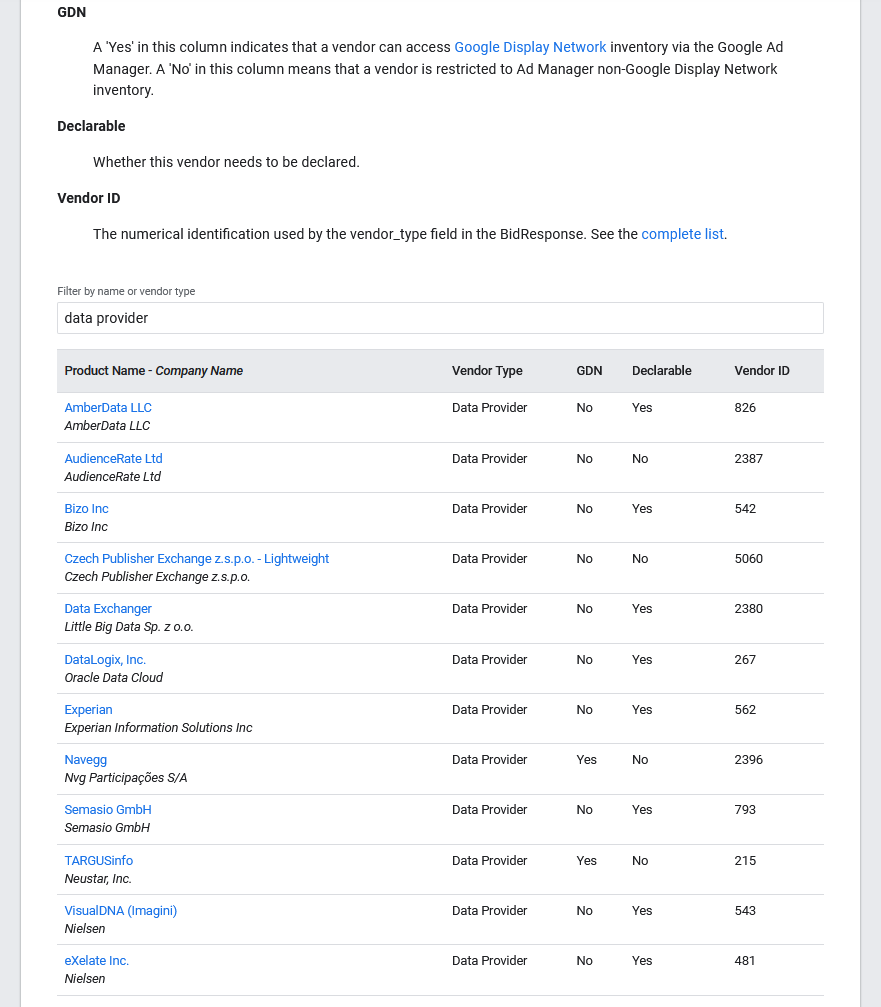
Interesting. Google refers to Oracle's Datalogix, which sells consumer profiles based on purchase data from thousands of shops, as a "key external vendor".
From a job announcement for an "Insights Manager, Global Client & Agency Solution" at Google EMEA:
webcache.googleusercontent.com/search?q=cache…
From a job announcement for an "Insights Manager, Global Client & Agency Solution" at Google EMEA:
webcache.googleusercontent.com/search?q=cache…

It's interesting because I didn't often see Google naming Datalogix a partner/vendor in recent years.
In 2016, DoubleClick named Oracle Data Cloud an offline conversion partner:
doubleclick-advertisers.googleblog.com/2016/10/get-be…
In 2018 it was named a "Google Measurement Partner":
blogs.oracle.com/oracledataclou…

In 2016, DoubleClick named Oracle Data Cloud an offline conversion partner:
doubleclick-advertisers.googleblog.com/2016/10/get-be…
In 2018 it was named a "Google Measurement Partner":
blogs.oracle.com/oracledataclou…


In this list of "Ad Manager Certified External Vendors", Google names Datalogix a "data provider":
developers.google.com/third-party-ad…
In this newer list of "Ad technology providers", Google lists Oracle Data Cloud as a vendor who may serve and measure ads in EEA/UK:
support.google.com/admanager/answ…

developers.google.com/third-party-ad…
In this newer list of "Ad technology providers", Google lists Oracle Data Cloud as a vendor who may serve and measure ads in EEA/UK:
support.google.com/admanager/answ…


I have no way to see which third-party data providers supply/resell data via Google's adtech services.
But Oracle's BlueKai is one "example", according to the Google DV360 / Bid Manager API docs.
I think G should be obliged to disclose it all, at least.
developers.google.com/bid-manager/gu…
But Oracle's BlueKai is one "example", according to the Google DV360 / Bid Manager API docs.
I think G should be obliged to disclose it all, at least.
developers.google.com/bid-manager/gu…

Also, Oracle's "Moat" is one of a few data companies integrated with Google's "Ads Data Hub", where Google's clients can join user data with Google data based on all kinds of individual-level identifiers in different ways.
developers.google.com/ads-data-hub/v…
https://twitter.com/WolfieChristl/status/1351545071443832833
developers.google.com/ads-data-hub/v…

Acquired by Oracle in 2017, Moat does not only provide ad fraud prevention, brand safety, verification and 'attention analytics', but also measures ad 'effectiveness' based on POS data, credit card data and location data.
POS data is basically Datalogix.
oracle.com/a/ocom/docs/mo…
POS data is basically Datalogix.
oracle.com/a/ocom/docs/mo…

Btw. In 2017, Google said it captures 70% of US credit/debit card transactions through third-party partners:
blog.google/products/marke…
@EPICprivacy filed an FTC complaint about Google's purchases tracking:
epic.org/2018/05/epic-r…
Google still refuses to disclose its data sources.
blog.google/products/marke…
@EPICprivacy filed an FTC complaint about Google's purchases tracking:
epic.org/2018/05/epic-r…
Google still refuses to disclose its data sources.

• • •
Missing some Tweet in this thread? You can try to
force a refresh









